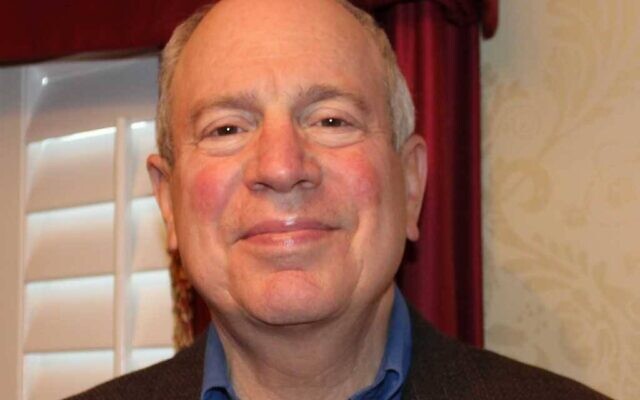Rabbi Albert Slomovitz’s 2021 Rosh Hashanah Message
Read community insights, perspectives, and opportunities seen as we enter into the 5782/ 2021 New Year.
Rabbi Albert I. Slomovitz is an assistant professor of history at Kennesaw State University, a retired military chaplain, and the author of “The Fighting Rabbis” and “America’s Other Clan: The United States Supreme Court.”
Experiencing a Different High Holidays
This year, many of us will observe the High Holidays in a variety of ways, on zoom or live stream, in synagogue, in an outdoor setting, or privately. It will be a challenge to experience these wonderfully spiritual days in our usual ways. While this year, as the last, was not normal, we have had similar situations in the past and achieved successful holidays. Allow me to share one such event.
In the summer of 1916, a large number of U.S. troops, under the leadership of General John J. Pershing, had been sent to the Texas-Mexico border to deal with armed attacks against American citizens and interests in that area. Among those many thousands of troops were Jewish soldiers. Initially, local rabbis and rabbinical students provided Shabbat services for them. Soon, the various rabbinical associations in America were contacted to provide a rabbi to officiate for the troops during the High Holiday period. Rabbi Isaac Landman, the corresponding secretary of the Central Conference of American Rabbis, volunteered to be one of the rabbis to be with the troops.
The Secretary of War had concluded that there were at least two thousand Jewish troops serving in the border area needing rabbinic coverage. The Secretary agreed that any rabbi appointed would be provided with, “an official order giving him … every possible courtesy and attention, but no pay.”
Upon his arrival, Rabbi Landman arranged for a place of worship, obtained religious items, publicized his presence and made a schedule of holiday services. The military cooperated by giving Jewish soldiers the time to leave their posts to attend services. In a written account of one such Rosh Hashanah service, Landman describes how in the early morning hours, 150 Jewish men prayed, while their non-Jewish comrades surrounded them and respectfully followed the service. Landman arose at 5 a.m. and used a ration-wagon as a temporary altar. Enjoy this account of his High Holiday service.
Not a single star, as far as I had a record of them after the service out of the evening before, had disappeared. Out of the darkness and from all directions, men sprung up. Some of them were equipped for the march. These were from the Illinois and Wisconsin Infantry. They had to walk two miles through the night to reach Hill B, and back to join their companies after the services on the road. There we sat around the wagon, our numbers being constantly augmented, silent, thrilled with the moment and the occasion, waiting for the sun to rise. Soon the stars began to fade. A gleam of pink showed in the east. The barrels of a gun or two glittered, for a second, in the first rays of daylight. “Rabbi, the sun is rising,” said one of the men. Never did that title mean more to me than at that moment. “The sunshine of the New Year,” exclaimed a soldier, another pronounced, “May God Bless Us.”
Silently, I climbed into the wagon and faced the rising sun. The men rose in their places, to the clank of their arms and accouterments and brought out their precious little prayer books. (Small size prayer books designed to fit into military uniforms.) For my part I was choked with emotion. I could not begin to read. “Bugler!” I said, trembling, to Bugler Sam Mehon of the Second Illinois Field Hospital, whom, the night before I had taught the sounds of the Shofar. “Bugler! Sound the Shofar!” and contrary to all traditions, I began a Rosh Hashanah service with the sound of the Shofar. The long steady T’kiah call (long-blast) served to have awakened the sun, to hurry in his course for the sake of these military men who were waiting to worship God, for, when I opened my book, I could read.
May this New Year be filled with sunshine and a reduction of the virus. May it be one filled with the sounds of the Shofar that reminds us of faith, family and friends.
Have a happy and healthy New Year.
Rabbi Albert I. Slomovitz, Ph.D.; rabbi-at-large, Etz Chaim Congregation; founder, Jewish Christian Discovery Center; professor of American history, Kennesaw State University.
- rosh hashanah
- Community
- Rabbi Albert Slomovitz
- congregation etz chaim
- Jewish Christian Discovery Center
- Kennesaw State University
- High Holidays
- General John J. Pershing
- Texas-Mexico border
- American citizens
- Jewish soldiers
- local rabbis
- rabbinical students
- Shabbat services
- Rabbi Isaac Landman
- Central Conference of American Rabbis
- Secretary of War
- Illinois Infantry
- Wisconsin Infantry
- Bugler Sam Mehon
- Second Illinois Field Hospital
- Shofar
- T'kiah




comments